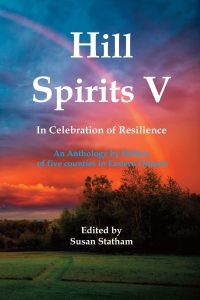Manifest Lifespan is a story of a man who decides to live for a very long time and the implications of his success — or failure — to meet his goal.
It is included in the anthology Hill Spirits V, published by Blue Denim Press and available as a paperback and Kindle edition.
I read a brief excerpt at the book launch event. A transcript follows.

Transcript
Note: This excerpt has minor edits to make it easier to read aloud. The frequent ellipses are there to remind me to slow down.
Roger wasn’t sure when it made the transition from a hypothesis to belief, or when it went from belief to faith.
Whenever it was, he regretted it as deeply as any thought he’d ever had. No matter. For a few more moments, here he was.
Long long ago, maybe in his forties, Roger observed that most people had no real expectation for their lifespan. When their time was up, it was up. C’est la vie. But others were different.
Some set clear expectations. . . Early on they aimed to live until they were 30, 50, 90. . . or even 100.
Roger started to notice that a lot of people who set their expectations came very close to meeting them. Certainly not everyone. . . Some were victims of mishap, some lived longer. . . sometimes far longer than they had expected.
But many who truly believed that they’d live to a particular age often came very close to doing so.
This dovetailed with how Roger saw others live their lives. These people feared death but they never tried to negotiate with it. They lived, filled their lives with the moment, played the cards they were dealt, didn’t give it much of a second thought. By and large they all seemed happy. . . except perhaps at the very end.
Then there were the “intentionalists” — the Think and Grow Rich types. Noting that most successful people had the intention to be successful, they falsely inverted the logic, concluding that intention was all that was required for success. They did not grasp that while intention is necessary, it is not sufficient.
Unable to accept that if two people were competing for the same prize, and if both had been equally dedicated to manifesting a future where they won that prize, at the end there was still precisely one prize. The universe simply did not split into two and allow both to win.
Yet in defiance of this logic, the odds did seem to favour those who had the greatest fervour in their intention. While universes did not bifurcate to meet every deeply held desire, imagining the future somehow had influence over the general direction of future events.
Roger had once heard a Zen master say, “Imagine a future of war, and you will get war. Imagine a future of peace, and you will get peace.” The only theory that fit was that the universe was in fact some sort of grand simulation. In effect, a game where collective expectation could alter future realities.
By the time he was in his fifties, this was Roger’s truth. Many expectations for his life had already held true. He wanted two children, a boy and a girl. He got two girls. . . and one transitioned.
He wanted a great love, and he had one, although ultimately it rendered his heart in shards. As he reassembled the pieces, he wished for a gentler love and he found that in Carol.
Roger came to believe that if life really was a simulation, then some external force had to be operating it. . . much like playing a game. Never much of a theist, he imagined a society where intelligent beings lived for a very long time, thousands or even millions of his years. In this place a “human lifespan” would be a blink, like playing an old arcade game. What he saw as fifty years of an uneven life, might be a brief moment for this intelligence in a universe that he might never become aware of. He thought of that consciousness. . . ready to casually evaluate his life and either hit the “play again” button or move to the next form of entertainment. He imagined a console emblazoned
“Life on Earth, 25 cents per play, three plays for 50.”
If this theory held, he could change the “game play” merely by setting an intention. . . and elevating it to a belief. Even though age was starting to set in uncomfortably, life had been acceptably good so far. The thing to do was to decide to live longer.
Much longer. . . but not forever. Forever had been tried a hundred million times and had never worked.
Roger decided he wanted to live to be two hundred and fifty years of age. That was his fateful hypothesis. Over time he stuck to it. . . He repeated it to himself. . . He told his friends. . . When told of someone reaching an age of 110, he’d say they were 140 years short. He said it so many times that he came to believe it. In time, it developed into a deep faith.